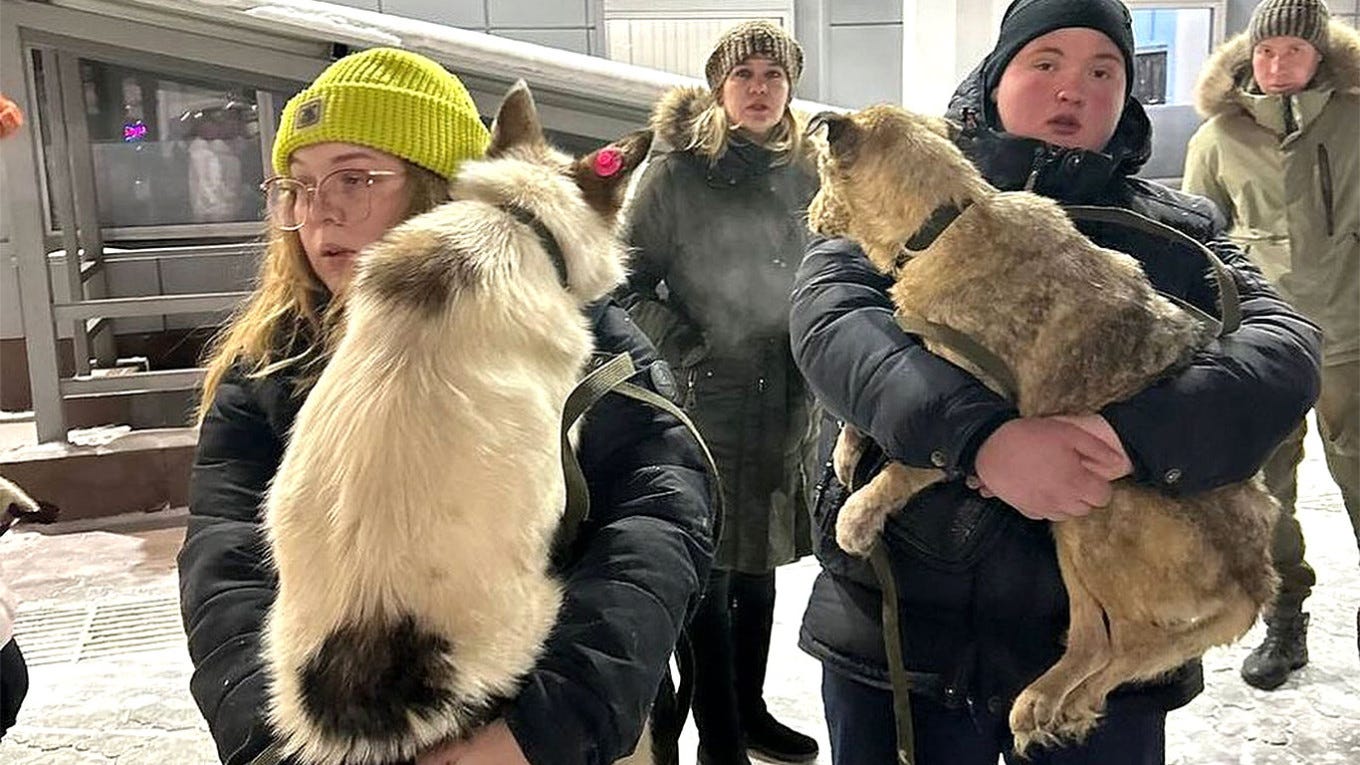Left out in the cold
Thousands of Russians experience heating outages due to decaying public utility networks
Hello from the Bear Market Brief, and happy 2024!
This week in the news:
Significant heating and electricity outages in several Russian regions prompted a response from President Putin.
Russian annual inflation was 7.42% in 2023 according to official statistics.
The Novosibirsk City Assembly surveyed residents about what qualities they would like in an appointed mayor.
The Ukrainian Ministry of Defense submitted a new draft bill on mobilization and military service.
Ukrainian authorities confirmed that Russia used a North Korean missile in its January 2 attack on Kharkiv.
A burning issue
Over the past week, the residents of several Russian regions faced significant public utility outages, affecting mostly heating and electricity networks. While such disruptions of service are common in Russia’s regions due to the decay of public utility networks—a long-standing and gradually worsening issue (which the independent outlet iStories described in detail in an article last year)—the weather was especially inclement in many of the affected regions. The amount of reporting on these incidents in Russian media also seems anomalously high. In the town of Podolsk in the Moscow Region, for example, the explosion of a heating main in a military production plant resulted in heating outages in thousands of apartments.
People in several regions turned to Putin for help, and the reports from the Moscow Region prompted him to respond. The President went on television and announced the nationalization of the military plant and ordered officials to restart heating. A deputy mayor and two executives were promptly arrested. This presidential intervention looks similar to earlier episodes in which Putin personally took charge of crisis situations; most famously in the town of Pikalyovo, where, following protests, Putin publicly ordered the reopening of three factories and humiliated aluminum tycoon Oleg Deripaska. Last week’s televised speech was not quite as dramatic as Putin’s personal appearance in Pikalyovo 14 years prior, but this reflects the Russian leader’s increasing reclusiveness and aversion to big crowds. In both cases, Putin reacted to a widespread problem when it reached the (extended) outskirts of one of Russia’s capitals, and resorted to sticking-plaster solutions and political theater instead of a systemic solution.
The decay of public utility networks is a well-known problem in the country. Even the deputy chair of the Duma's relevant committee noted last year that around 80% of utility networks are in need of repair. Additionally, a state-stimulated construction boom and Russia’s trade pivot to the East will likely put further strain on utility networks. Still, the government has been dragging its feet on solving the issue in a comprehensive manner. It tried (mostly unsuccessfully) to attract private money into the sector via ppp projects and legal reforms. In 2023, after a series of protests against growing utility bills and worsening service quality, the government briefly increased transfers to regions to spend on housing and utilities. However, budgetary plans for 2024-2026 foresee a gradual reduction of federal funds allocated for this purpose, from 881 billion ($10 billion) to 381 billion ($4.3 billion) rubles per year. As long as military production is the focus of the budget, this is unlikely to change.
The government will still expect regional officials to keep tabs on these issues and intervene if they represent an immediate political risk (as it happened in Dagestan, where residents have faced outages for months). Governors who fail to do so can expect a reprimand: indeed, political scientist Yekaterina Schulmann suggested that one reason for the heightened media attention to the Moscow Region’s troubles could be the political ambitions of its governor, Andrei Vorobyov, an ally of defense minister Sergey Shoigu. Otherwise, the Kremlin’s reaction shows the core logic of Russia’s crisis management system: when a problem is too obvious and too widespread to ignore or easily fix, the system’s main function is to shift the blame from the Kremlin to local actors. This is especially important in the pre-election period.
— Andras Toth-Czifra
After going missing for nearly three weeks, jailed Kremlin critic Alexei Navalny has resurfaced in a remote Arctic prison. “We have found Alexey Navalny. He is now in IK-3 in the settlement of Kharp in the Yamal-Nenets autonomous district,” Navalny’s spokesperson Kira Yarmysh wrote on X. The “special regime” prison colony is known for being one of Russia’s most northern and remote, with particularly harsh conditions. Navalny appeared via video link on Wednesday for his first court date since the transfer. “A tear is running down my cheek. I’m so glad to see you all,” he said from his cell. (photo: Alexandra Astakhova)
Annual inflation
According to Rosstat statistics, Russia’s annual inflation amounted to 7.42% in 2023. This is slightly below than the Central Bank’s prediction, which forecasted inflation would rise to 7.6% by the end of the year. However, inflation slowed in December, defying expert expectations and coming down slightly to 7.4% y-o-y (compared to 7.5% in November). This may have been due in part to the CBR hiking the key rate for the fifth time in a row on December 15. The Bank increased the rate from 15% to 16% in their continued effort to bring inflation down to the 4% target. “Current inflationary pressures remain high,” the Bank explained in its statement.
Both the CBR and the Kremlin remain deeply concerned about inflation’s effect on the upcoming presidential election. Although Deputy Chairman of the CBR Alexey Zabotki said that the Bank will likely maintain tight monetary policy “for a long time,” Putin reassured constituents that the high key rate was a “temporary phenomenon” during this week’s pre-election tour of the regions. Cost of living concerns are of particular interest to the President, who went on to discuss the sudden spike in egg prices. The price of chicken eggs increased by a whopping 61.35% in 2023 (the price of food products in general only went up by 8.86%). Egg prices continued to soar in December, leading to increasing unrest. In response, the Ministry of Economic Development suspended the import duty on eggs from “friendly countries” for the first six months of 2024, although the Russian Poultry Union warned that this is unlikely to bring prices down. Regardless, the government’s quick action on the issue suggests that addressing inflation remains a key issue for Putin ahead of the presidential election.
— Sara Ashbaugh
Surveys instead of elections
The Novosibirsk City Assembly published an online survey inquiring about the qualities that residents would like to see in the city’s soon-to-be-appointed new mayor and how they envisage the direction of the city’s development. The survey, likely the penultimate step in the curbing of local self-governance in the city, comes a year after the Novosibirsk Region scrapped direct mayoral elections in Russia’s third largest city. It’s also just days after the dismissal of the city’s Communist mayor, Anatoly Lokot, who was directly elected in 2014 and 2019. That move ended a long-standing power-sharing deal between the regional chapter of the Communist Party (representing a significant chunk of the regional elite) and the region’s governor, Andrey Travnikov (an outsider).
Activists and independent deputies have demanded a referendum on the restoration of direct mayoral elections, but these were rejected by the local electoral authorities (not even Lokot supported them unequivocally). The new “city manager” will be elected in the near future by the municipal assembly after a selection committee picks candidates. He or she is expected to be an ally of Governor Travnikov. The same thing happened in 2023 in Tomsk, another major city with relatively pluralistic politics. Dmitry Makhinya, an Omsk Region official and ally of Governor Vladimir Mazur, was appointed mayor in September after a months-long standoff in the municipal assembly. In both cities, the authorities cracked down on independent municipal deputies: Ksenia Fadeeva from Tomsk was sentenced to 9 years in prison on December 29, while Novosibirsk deputies Helga Pirogova and Sergey Boiko were stripped of their mandates.
— Andras Toth-Czifra
Animal rights activists in Buryatia are evacuating stray dogs to other regions after a new law legalized the euthanasia of homeless animals. Under the Buryatia regional law, dogs in shelters must be adopted or claimed by their owners within 30 days or they can legally be put down. Although shelters are allowed to keep dogs past that period, it would be at their own expense—state funding for shelters ended last year. At least 18 dogs have already been euthanized in Ulan-Ude’s largest private shelter, Ananda, which currently houses around 2,000 dogs. (photo: BarkingStore / Instagram)
Ukraine’s new mobilization law
For the past six months, the Ukrainian Ministry of Defense has been working on a new law on mobilization and military service. The draft bill was submitted to the parliament on December 25, causing heated debates on proposed changes to conscription processes and penalties for draft evasion. Among the proposed restrictions are banning those who dodge military registration and service from traveling abroad, restricting their rights to drive a vehicle or obtain a driver’s license, and suspending access to state-provided benefits and services. Dmytro Lubinets, Ukraine’s human rights ombudsman, commented that such penalties would be a violation of constitutional rights.
On January 11, the parliament returned the draft law to the government for a revision. David Arakhamia, the parliamentary leader of the Servant of the People party, commented that some provisions of the bill violated human rights, while others were not articulated clearly. Later that day, Ukrainian Minister of Defense Rustem Umerov posted on Facebook that the Ministry prepared a revision of the draft following discussions with the members of the parliament. “We are ready to submit it for the Government’s approval in the near future. The previous version of the bill was withdrawn,” Umerov wrote.
On top of a controversial mobilization draft law, President Zelensky mentioned in early December during a press conference in Kyiv that Ukraine’s military leadership proposed to mobilize 450,000-500,000 additional conscripts, sparking further controversy. This was later denied by Ukraine’s Commander-in-Chief Valerii Zaluzhnyi. Zaluzhnyi, however, would not disclose how many people the military was planning to mobilize, saying that the number is a military secret.
— Lisa Noskova
Russia is using North Korean missiles in Ukraine
Ukraine’s Prosecutor General Andrii Kostin said that there is evidence that Russia used a North Korean missile during its attack on Kharkiv on January 2. According to Kostin, following the analysis of the missile parts and impact site, preliminary scientific and technical examinations confirmed that the missile was manufactured in North Korea. He added that military experts from the interagency working group under the Prosecutor General’s Office reached the same conclusion. “A comprehensive examination is currently underway,” Kostin said.
Last week, the White House reported that Russia deployed North Korean missiles in recent attacks against Ukraine. At that time, Ukrainian authorities could not confirm this information. However, Kharkiv Governor Oleh Syniehubov commented that the origin of missiles used by Russia during recent attacks was indeed unknown.
On January 11, South Korean Defense Minister Shin Won-sik said that in addition to ballistic missiles, Pyongyang may sell new types of tactical guided missiles to Moscow. According to the Minister, North Korea is estimated to have provided around 5,000 containers of weapons to Russia as of December, which can accommodate around 2.3 million rounds of 152 mm shells or around 400,000 rounds of 122 mm artillery shells. Shin also expressed concerns over Russia potentially providing technological assistance to the North Korean weapons program in return for the arms trade.
— Lisa Noskova
On the Podcast
Almost two years after Russia’s full-scale invasion, the Bear Market Brief investigates how we got here in the first place. What does theory say about Vladimir Putin’s decision making? Seva Gunitsky joins to discuss.
Quickfire: Regions
In spite of assurances by the Agriculture Ministry (whose head, Dmitry Patrushev, was publicly chided in Putin’s call-in show in December) that egg prices are stabilizing after Russia started importing eggs from Turkey and Azerbaijan, several regions continue experiencing egg and poultry shortages and egg inflation continues to dominate local news. According to Galina Bobyleva, the head of the Russian Poultry Association, the volume of imports is too low to have a meaningful effect on prices, which rose by more than 40% since the beginning of last year, likely due to supply chain issues and a rise in the cost of production due to the consequences of Russia’s war against Ukraine. In December, the Prosecution and the Investigative Committee both launched investigations into the matter, looking for price fixers. The Federal Security Service also showed interest; nonetheless, this has not helped to push prices down either. The federal authorities now seem to be concerned that the issue may prompt outbursts of dissatisfaction before the March presidential election.
Belgorod Region authorities are evacuating families from the city following missile attacks on Belgorod, of which the authorities accused Ukraine. Residents are sent to other cities within the region and to neighboring regions, and a school holiday was extended. The attacks, which killed at least 25 people, started after Russia’s massive missile attacks on Ukrainian cities in December, which killed more than 60 civilians. Authorities also reported that militarized drones were discovered and shot down in the Kursk Region near the region’s nuclear power plant and in the Oryol Region. Russia had accused Ukraine of drone attacks against the plant in Kurchatov, 70 kms (44 miles) from Russia’s border with Ukraine.
Ivan Sovetnikov, the head of Russia’s Federal Forestry Agency, pushed back against growing fears that due to the increased weight of the Chinese market in Russia’s wood exports, Chinese companies will “fell all the forests” in Siberia. Sovetnikov reacted to increased unease about Siberian and Far Eastern logging. These concerns also came up in 2023 when the Duma started discussing a bill easing logging restrictions around Lake Baikal. While data suggests that lumber exports over the past two years have actually fallen (mostly due to Russia losing Western export markets), China has increased its imports. In 2023, more than half of exported Russian lumber went to China. Fears of Chinese companies using the situation to exploit Russian natural resources have grown in several regions.
— Andras Toth-Czifra









